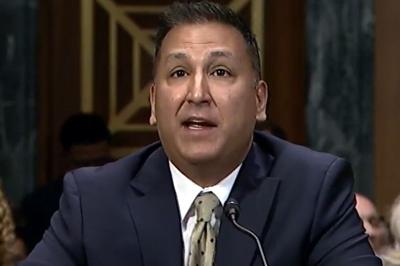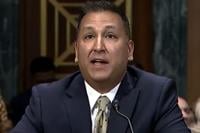
U.S. District Judge Sunil Harjani
CHICAGO - While saying it is clear the investors are using his court solely for profit, a Chicago federal judge will nonetheless allow a subsidiary of Burford Capital, the world's largest lawsuit investment group, to continue suing turkey producers over alleged price fixing claims because, the judge said, Burford is acting within the law to press a claim assigned to it under a deal with the original plaintiff Burford had supplied with money to bring the lawsuit in the first place.
If companies don't like it, the judge said, they need to ask Congress to change the law.
On June 30, U.S. District Judge Sunil Harjani ruled in favor of Burford subsidiary Carina Ventures LLC in the litigation financier's long running court fight with producers of turkey and other meats over Burford's right to step in place of food distributor Sysco Corporation and sue them over alleged illegal antitrust food price manipulation.
In the ruling, Harjani conceded he had concerns about Burford's involvement in the legal action, through Carina.
"Our federal judicial system exists to remedy the wrongs of individuals and companies through litigation," Harjani wrote. "Its purpose is not to act as a market for investment vehicles to buy claims from the allegedly injured for a price, and then seek to make a return on that investment through federal litigation.
"That is exactly what Carina hopes to do, as the original turkey purchaser (Sysco) is long gone, and Carina’s only interest is maximizing a settlement amount or a verdict in its favor to make a profit for its investors. To its credit, it is not shy about this objective."
However, Harjani said he believed courts cannot stop profit-driven lawsuit investors from stepping into court in place of their original clients if those original clients agree to let them, even if defendants cry foul over the allegedly unseemly use of America's courts.
Harjani said he believed federal law does not allow such "a public policy prohibiting litigation funders from litigating an antitrust claim after receiving that claim through assignment," even if "defendants try to will it into existence..."
"But this Court is not the proper branch of government for Defendants’ complaints and doomsday scenarios," Harjani said. "Federal judges are not in the business of creating public policy for new developments in litigation that might be disfavored. That role falls to Congress, whose job it is to write the statutes and rules that govern federal litigation. Congress has not yet spoken on the matter."
Burford has been in court for years against many of America's largest producers of animal protein products as part of a sprawling action launched by trial lawyers from throughout the country on behalf of grocers, wholesale food distributors and consumers.
Under those actions, producers of chicken, pork, beef and turkey have been accused of violating federal antitrust law by allegedly conspiring to artificially set the price of meat too high, costing American retailers, wholesalers and households potentially billions of dollars more than they allegedly should have paid.
While many of those actions have settled, some claims still remain.
One lawsuit in particular, filed by Sysco, drew national attention when Sysco and Burford brawled in court in 2023 over who should ultimately control Sysco's legal claims.
At that time, Sysco sought to settle its claims over chicken prices, according to court documents. However, that settlement was opposed by Burford subsidiaries, including Carina.
According to court documents, Burford had invested at least $140 million to fund Sysco's lawsuits and intended to generate a substantial profit on its investment. However, according to court documents, Burford believed Sysco had settled for too little and sought to seize control of the proceedings and force Sysco to remain in court.
In the resulting exchange of briefs, Sysco pulled back the curtain on their arrangement, offering a rare glimpse at the controversial world of third party litigation financing (TPLF.)
The practice has stirred growing concern from many in the U.S. business community, in Congress, and elsewhere, with critics asserting the TPLF arrangements offer openings for foreign powers, such as China, to use lawsuits to harm the U.S. economy by extracting huge payments from American defendants or undermining national security using court-ordered discovery to obtain American corporate secrets.
In recent days, Congress has held hearings on the implications to national security and the U.S. economy. And some Republicans in Congress have sought to begin taxing profits earned through TPLF. An attempt to add such a tax to the so-called "One Big Beautiful Bill" failed, just before the U.S. Senate approved the overall OBBB on June 30.
In the dispute between Sysco and Burford, Sysco accused Burford of lying about how much control it exerts over lawsuits, using their investments to drag out litigation to secure as much return on their investment as possible, allegedly with less regard for the actual strength of the case.
Ultimately, Burford and Sysco settled their dispute, with Sysco assigning the rights to its legal claims over to Burford, through Carina. The Burford entities have since persisted in the actions against the meat producers.
The producers, however, have pushed back in court, claiming repeatedly in separate antitrust proceedings over the prices of chicken, pork and turkey that courts should not permit this, as it allows a party with purely financial interest, who was never harmed by any alleged misconduct on the part of the defendants, to use the courts to maximize profits, rather than settle actual disputes rooted in cognizable legal injuries.
To this point, those attempts have met with mixed success.
In the antitrust case against pork producers, for instance, a federal judge ruled Burford could not essentially legally pinch hit for Sysco, because the court held the discretion to decide the proper party following Sysco's exit.
However, in the case over turkey prices, Judge Harjani said Sysco had never been a party in the action in court. Rather, after Sysco assigned the rights to its claims against turkey producers, it was Carina that filed the actual lawsuit in federal court.
And in the case over turkey prices, Judge Harjani said Burford appears to have found a legal loophole that will allow it to continue their case, despite what the court recognized as a naked money grab underlying the proceedings.
Therefore, Harjani said the Burford and Carina are not acting as litigation investors in this instance, but rather as the actual plaintiffs.
To forbid Burford and Carina to continue the case at this point would mean the court would be essentially creating a new public policy that has no grounding in the law, Harjani said.
The judge said defendants need to take their case to Congress, which he said is the only governmental body that can change the law to specifically forbid such profit-driven lawsuit arrangements.
"The question before this Court is not a discretionary one of weighing who would be the better party, Sysco or Carina, to bring these claims, but rather if a public policy exists that would prohibit Carina from bringing those claims and leading to a judgment for defendant," Harjani wrote. "The Court finds it does not."
Harjani said his decision should not be read as "an endorsement of litigation funders activities in all scenarios."
But he noted that while companies claimed allowing Burford to continue their lawsuit would result in many more similar allegedly underhanded profit-driven arrangements, Harjani said "the fears Defendants extol have not yet come to pass" outside of the meat price antitrust cases.
"As litigation funders continue to be involved in the legal system, the bounds of their viability will be tested," Harjani wrote. "There are certainly merits to allowing litigation funders to support claimants who could not otherwise afford to bring a lawsuit, and conversely, justly raised concerns about the implications of their involvement, particularly on using the federal courts as a means to generate investment profits.
"But it is not the place of federal courts to decree the wisdom of such a policy."
Burford, through Carina Ventures, is represented in the case by attorneys Christopher C. Goodnow and Jonathan I. Liebman, of the firm of Kellogg Hansen Todd Figel & Frederick, of Washington, D.C.
The turkey producer defendants include Perdue Farms; Butterball; Hormel Foods; Jennie-O Turkey Store; Prestage Farms; Tyson Foods; Raeford Farms; Cooper Farms; Foster Farms; Cargill; and Farbest Foods.
They are represented by attorneys Danielle R. Foley, of Venable LLP, of Washington, D.C.; Colin R. Kass, of Proskauer Rose, of Washington, D.C.; Craig S. Coleman, of Faegre Drinker Biddle & Reath, of Minneapolis; William S. Cherry III, of Manning Fulton & Skinner, of Raleigh, North Carolina; Gaspare J. Bono, of Dentons US LLP, of Washington, D.C.; Britt M. Miller, of Mayer Brown, of Chicago; Aaron R. Gott, of Bona Law, of Minneapolis; Jennifer A.L. Battle, of Carpenter Lipps, of Columbus, Ohio; Gregory G. Wrobel, of Vedder Price, of Chicago; Tiffany Rider Rohrbaugh, of Axinn Veltrop & Harkrider, of Washington, D.C.; and others from those firms and the firms of Falkenberg Ives, of Chicago; Clausen Miller, of Chicago; Miller Canfield Paddock & Stone, of Chicago; Hogan Lovells US LLP, of Washington, D.C.; and Eimer Stahl, of Chicago.


